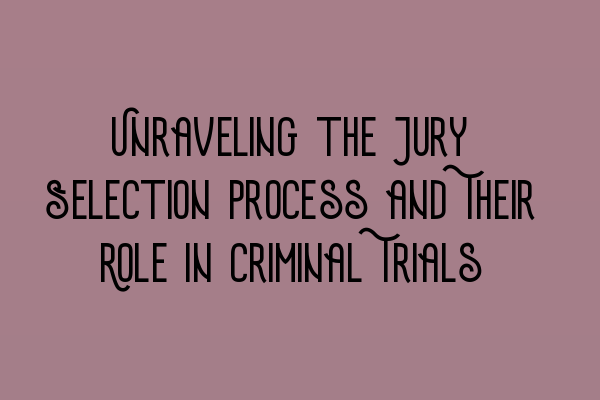Unraveling the Jury Selection Process and Their Role in Criminal Trials
Welcome to the SQE Criminal Law & Practice Law UK blog. In this article, we will delve into the intricate world of jury selection and discuss their crucial role in criminal trials. The jury selection process is a vital element of the judicial system, ensuring fairness, impartiality, and diverse perspectives in deciding the fate of the accused.
Understanding the Jury Selection Process
The jury selection process, also known as voir dire, is the process of selecting individuals to serve on the jury for a specific criminal trial. It involves thorough examination and questioning of potential jurors to assess their suitability and impartiality. The goal is to form an unbiased jury that can deliver a fair verdict based on the evidence presented during the trial.
During the jury selection process, the prosecution and defense attorneys have the opportunity to question potential jurors to determine any biases, prejudices, or conflicts of interest that may affect their ability to make an impartial decision. Both sides have the right to challenge potential jurors through peremptory challenges or challenges for cause.
Peremptory challenges allow attorneys to dismiss potential jurors without providing a reason, while challenges for cause require a valid reason for the dismissal, such as a direct involvement in the case or a demonstrated bias. The number of peremptory challenges available to each side varies depending on the jurisdiction and the nature of the case.
The Role of the Jury in Criminal Trials
The jury plays a crucial role in criminal trials as the fact-finder and the ultimate decision-maker. They are responsible for evaluating the evidence presented, assessing the credibility of witnesses, and determining the guilt or innocence of the accused. It is the duty of the jury to apply the law as instructed by the judge and render a verdict based on the facts presented during the trial.
Juries are expected to approach their deliberations objectively, putting aside any personal biases or prejudices. Their role is to consider the evidence and arguments presented by both the prosecution and the defense before reaching a unanimous decision, in most cases. However, in certain circumstances, a majority verdict may be accepted, depending on the jurisdiction.
The importance of a fair and impartial jury cannot be overstated. It is essential to have a diverse jury that represents a cross-section of the society to ensure different perspectives and prevent potential biases. A fair trial depends on the integrity and competence of the jury to uphold justice.
Conclusion
The jury selection process and the role of juries in criminal trials are integral to the functioning of the justice system. We hope this article has shed light on the complexities and significance of jury selection, as well as the crucial role played by juries in delivering fair and impartial verdicts.
For more information on the SQE Criminal Law & Practice Law UK, you may visit our website and explore other informative articles on related topics:
- SQE 1 Practice Exam Questions
- SQE 1 Practice Mocks FLK1 FLK2
- SQE 2 Preparation Courses
- SQE 1 Preparation Courses
- SRA SQE Exam Dates
